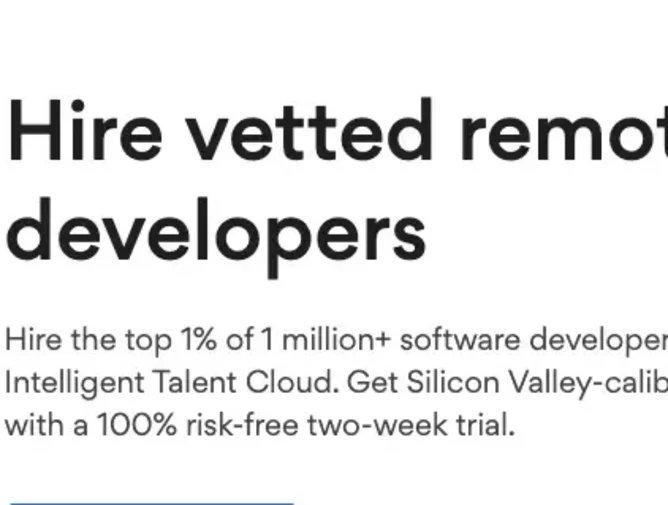Why remote freelancers are smart hires, and how to find them

If the last 20 months has taught us anything, it’s that remote working can and does work. As the pandemic forced everyone into remote working mode, the majority of businesses made it work, and nearly two years on the benefits for both organisations and employees have become clear.
Not only has employee productivity increased, which is good for business, but workers have reported feeling happier and healthier, in turn making them more engaged, productive and less likely to leave. Having a better work-life balance and saving time and money from not commuting are among the reasons cited for improved wellbeing in the remote workplace.
According to a Microsoft and BCG study of 9,000 managers and employees in large organisations across Europe, remote working increased workplace productivity by 34% during the pandemic. Such a surge in output was greater globally with GitLab finding a 52% increase in productivity of remote workers, according to its global survey of 3,900 professionals.
The report further found a 44% increase in employee morale, 43% improvement in employee retention and 19% increase in inclusivity, not to mention a 27% increase in employers being able to hire the best and brightest talent out there.
Remote working models give businesses a bigger talent pool
And this is where it gets especially interesting, because by considering remote working as an option – whether in-house or freelance positions – organisations have an unlimited pool of talent to tap into, and a diverse pool to boot.
With no need to restrict recruiting efforts within certain localities, companies can hire on suitability and skills alone and get better fits for the roles they have, while furthering their diversity goals.
“Remote work has become, what economists call, a general-purpose technology,” says Adam Ozimek, chief economist of work marketplace platform Upwork. “It has a wide range of uses that is embraced across the economy and creates a variety of spill-over effects and we are already seeing the signs of these effects.
“The embrace of a more fully remote workforce has enabled businesses to embrace new technology, reimagine how they onboard and train, and even allowed hiring managers to embrace the use of freelancers.”
Increased demand for remote-working freelancers
According to an Upwork study, as a result of the pandemic, 53% of businesses say that remote work has increased their willingness to use freelancers, with the largest increase in freelancer usage in the web, mobile and software development category, at 80%.
And this demand for remote working skilled freelancers is only likely to increase, given the current skills scarcity, especially in the tech sector, with 54% of organisations experiencing a shortage of tech skills, according to Statista.
Add to this the fact that a record number of workers are leaving their full-time roles, aka The Great Resignation – in part due to wanting to work remotely and enjoy a better work-life balance – and you have a recipe for remote working freelance success.
According to the US Bureau of Labor Statistics, in April 2021, the number of workers who quit their job in a single month broke an all-time US record, which was again broken in August.
Platforms connecting remote working freelancers and companies
Skilled freelance remote workers account for some 35% of the world’s workforce today. But how to find them?
There are plenty of platforms serving up networks and communities of freelancers across a plethora of fields and areas of expertise, including the well-known and more general Fiverr or Freelancer.com.
There are also more specialist platforms too, catering to specific skillsets. Take Sologig, which matches companies with experienced IT and engineering professionals; or Kolabtree, which caters to businesses that exclusively need scientific consulting. Almost all of Kolabtree’s freelancers are PhD-qualified scientists and academics available to help businesses address specific complexities, such as projects related to the biotech, chemical or pharma domains.
Whether you’re a company looking for specialist tech or creative skills, or for talent for a short-term assignment or a long-term or ongoing project, we round up four of the leading platforms for businesses to tap into.

1 Upwork
Serving all types of business, from one-person startups to multinationals, Upwork marketplace is used by 30% of the Fortune 100 with clients including Microsoft, Airbnb and GoDaddy. The platform delivers 10,000 skills via its community of talented remote workers in categories that include website and app development, finance and accounting, sales and marketing, consulting, and operations. In-demand skills include Python and JavaScript developers, data analysts and scientists, UX designers, software engineers, and SEO experts.
Once you post the role you need, the platform’s advanced algorithms help you shortlist candidates. They also have Talent Scouts who can help you curate a shortlist depending on your budget and goals.
The platform recently launched Virtual Talent Bench, a series of features that empower you as a business to discover, organise, revisit and hire the talent you trust enabling you to establish a network of top independent professionals you can work with on your most critical projects or complement skills sets on their full-time teams.

2 Toptal
Describing itself as an “elite network of the world’s top talent in business, design and technology”, and claiming to feature the top 3% of freelance talent, Toptal has become one of the world’s most popular on-demand talent networks since its launch in 2010.
Toptal matches skilled tech remote workers like engineers, software developers, designers, finance experts and product managers to clients across the globe and currently serves 1000 clients in over 10 countries, including the US. They rigorously test and vet all freelancers, and most deliver the advanced and specialised skills needed for the future workforce, from blockchain to AI.
The platform is used by big business and startups, including Bridgestone, Airbnb, Shopify and DuoLingo, with Bridgestone using Toptal freelancers to build a cross-platform app and the University of Southern California tapping them to develop a virtual assistant to improve mental wellbeing. You can hire from hourly to full-time and the platforms industry experts can work with you to understand your goals, technical needs and team dynamics.

3 Dribbble
This is the platform where businesses can find the world’s top designers and creatives. Used by some of the world’s best design-forward companies including Facebook, Google, Dropbox, Slack, Lyft, Timberland, Dell, Microsoft, Pandora and Apple, Dribbble connects you to a 100% remote-working team of experts across a wide array of creative disciplines including illustration, graphic design, animation, product design and typography.
The platform offers 10,000-plus expert creatives to choose from, dotted all around the world, so you can find someone in the language you speak, be it in Mandarin, Arabic or English.

4 Turing
Designed as a data-science-driven deep jobs platform, Turing brings together remote software developers to work on small and large company projects worldwide. Claiming to provide companies with the top 1% of software developers, and promising “Silicon Valley-calibre remote software talent”, Turing pulls this off by vetting carefully the remote software developers it hires. It uses an AI-based vetting process that not only tests developers’ skills but also how they work in groups and teams.
There are more than 100 skills on offer, from Node, Python and Swift, to React Native and Java, and the platform has a body of 1 million+ contractors working from more than 150 countries. They promise hiring in just three days and ensure matches are timezone-applicable for easy communication. More than 200 firms have used Turing to date including Google Ventures, Bloomberg, Khosla Ventures and A16Z.
- Which North American firms are the world’s best employers?Human Capital
- Meet Warner Bros’ diversity and inclusion leader Asif SadiqSustainability
- Marketing and web design are most commonly outsourced jobsHuman Capital
- Why your recruitment process must be more thoughtful in 2023Human Capital






